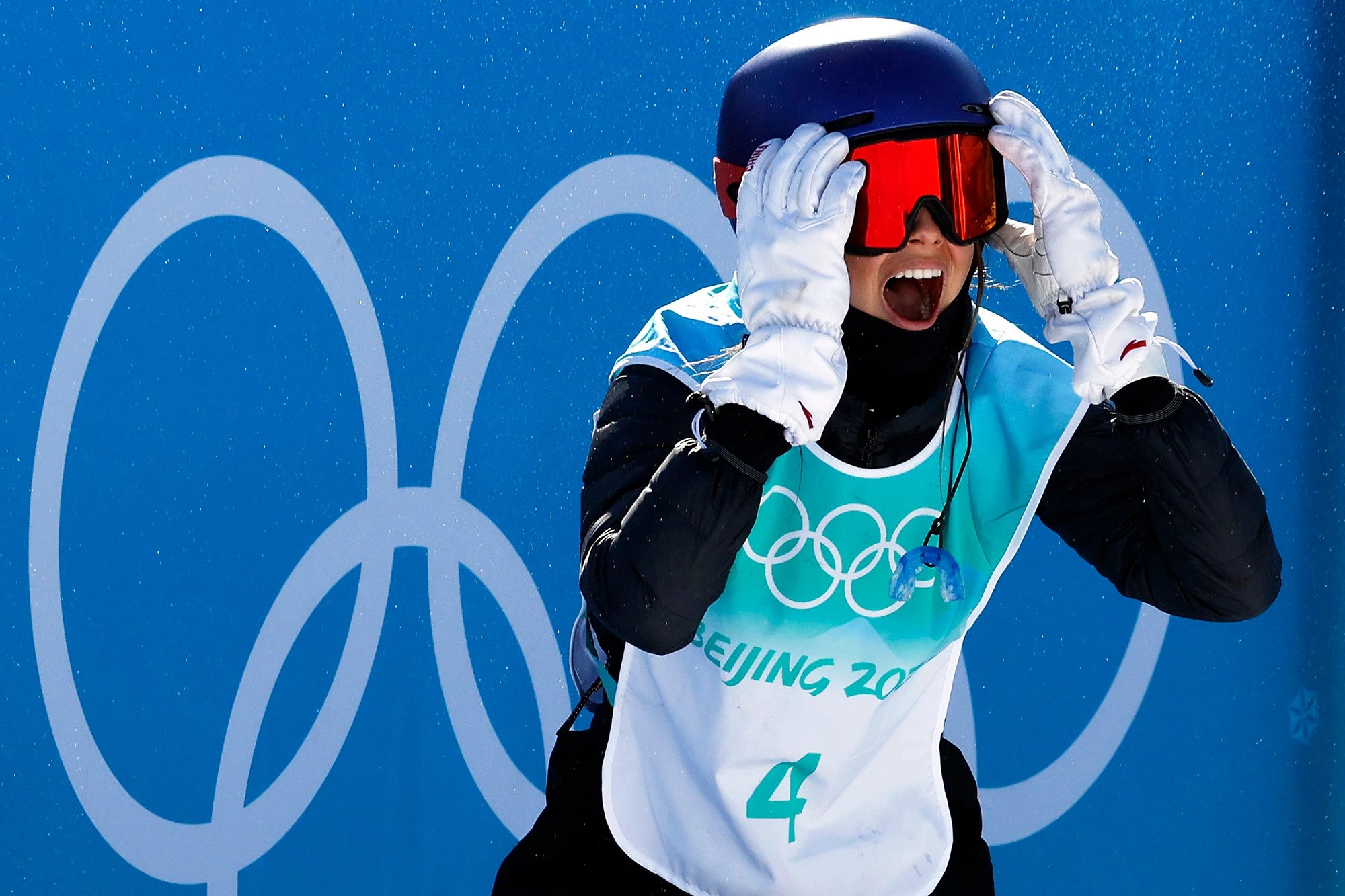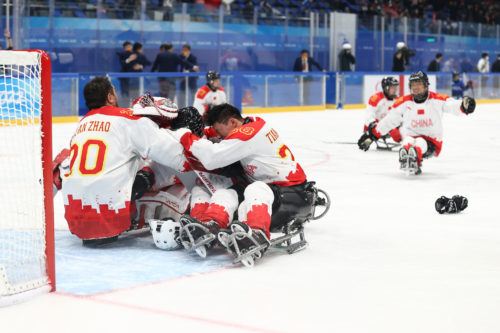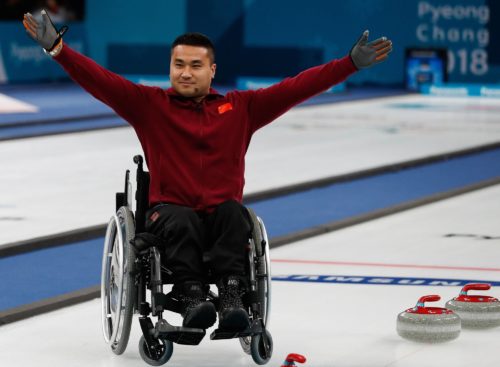Eileen Gu soars while questions about her citizenship linger
In this week's China Sports Insider Podcast, the hosts begin by talking about Eileen Gu, who "represents this uneasiness right now between the United States and China. She's the perfect nexus of this rivalry."

Gu landed the first 1620 of her career to score a 94.5 and jump from third to first place. Talk about delivering on the hype.
Naturally, she’s the focus of this week’s China Sports Insider Podcast. Hosts Mark Dreyer and Haig Balian begin the show by talking about Gu’s breathtaking win, and then delve into questions about her citizenship (4:14) and the way others have positioned her in the U.S.-China rivalry (6:13). An excerpt of their conversation is below. Listen to the entire show here:
Haig Balian: It has been full-on Olympics and, in my house anyway, it’s been full-on Eileen Gu.
Mark Dreyer: Well, in most people’s houses around the world. It’s crazy. We’ve been talking about this since the show began and I’ve been writing about her since before that, but the amount of attention she’s got in the last week or so has been unbelievable. You can’t go anywhere without reading commentary about it and — wow — is it ever triggering a lot of people.
Haig Balian: Can I just tell you how much attention there has been on Eileen Gu? There’s been so much attention that even I was asked for comment.
Mark Dreyer: Well, as co-host of China’s top-rated English-language sports podcast, you should be all over the news, Haig.
Haig Balian: I guess I’m getting there, one Norwegian paper at a time. So let’s start with this, Mark. Gu won gold yesterday — it’s Wednesday today. I tuned in just in time to see her final jump and, wow, it was an amazing jump.
Mark Dreyer: I’m going to give a little bit of context here. We’ve been following her for a while, but I didn’t really take to Eileen Gu through a lot of last year, ever since we started to think about the Olympics and who would be the big stars. She was obviously talented, but her commercialism was pretty relentless. She was posting about all kinds of different brands and so on. I didn’t say anything. I thought, “Look, I’m not going to call her out. She can post whatever she wants.” But we’ve seen so many times when athletes get distracted by the dollars, and then go off the rails — and she hadn’t even won anything yet. But frankly, she’s performed. Her World Cup season was unreal. She’s barely competed in big air and she turns up in the Olympics and nails it with the final jump. I mean, come on, she’s got better chances in her two other events. First and foremost, as an athlete, she is absolutely on top of her game. So, look, if she wants to do it all and she wants to have 35 endorsements and be a full-time model, and play the piano and speak all these languages and basically tick all the boxes, well, hey, if anyone can do it, she seems to be handling it pretty well. But of course there’s a lot more to it than that.
Haig Balian: I wanted to start with the athletic piece of this because I know we’re not going to just talk about that and there’s so much stuff going around her and her story, her decision to compete for China and how that’s being talked about both here and abroad. For example, you called Bruce Arthur’s column in the Toronto Star the best commentary on Gu that you’ve read so far. I just read it. It’s a really measured piece that acknowledges that Gu obviously has the right to compete for whomever she wants to compete for, but calling her out on not answering questions about her citizenship.
Mark Dreyer: Coming into these Olympics, I was asked so many times, “What are the things you’re looking at?” One of the key things that I was looking at was citizenship questions, not just for Eileen Gu but for the hockey players as well. Clearly, we knew that she was going to get asked these questions — does she have a U.S. passport? There was that whole thing where Red Bull had on their website that she’d renounced [her U.S. citizenship], and then the Wall Street Journal asked about it and then it magically disappeared, and she’s basically skirted around this issue. I kind of feel bad for her and here’s why: What is she supposed to say? If she can keep dodging the question and live in that gray area, that is the best-case scenario for her. I totally understand and support journalists asking the questions. If she says she still has a U.S. passport, then people in China are going to be pissed off. If she says she doesn’t still have it, then people in the U.S. are going to be pissed off and start calling foul and accusing her of hypocrisy. But if she’s basically managed it and worked it to her situation, then there’s no legal requirement for her to announce this.
Haig Balian: I do understand that she’s in a no-win situation if she answers the question, but in a way she’s sort of put herself in that situation. Why not just answer the question and get it behind her? I think if she has not renounced her U.S. citizenship, the only people that really should be annoyed with that are other Chinese who don’t have that right. Why would Americans care?
Mark Dreyer: Well, there’s a narrative that she’s betraying the country that raised her and how she’s a traitor. So there’s a lot of stuff there as well.
Haig Balian: Mark, last Sunday, we just talked to an Armenian skater who was born in Canada, trained in Canada, lives in Canada, but competes for Armenia, and no one gives a shit.
Mark Dreyer: You know why, though?
Haig Balian: She’s not a favorite. She’s not gonna win.
Mark Dreyer: Yeah, it’s the spotlight and it’s those two countries, isn’t it? It’s the U.S. and China right now. It’s the perfect geopolitical story, it really is.
Haig Balian: That’s the thing, right? But she represents this uneasiness right now between the United States and China. And she’s the perfect nexus of this…I don’t want to call it a conflict, but this rivalry.
Mark Dreyer: After her event yesterday was the first chance that journalists really got to ask her questions. And they kept saying she’s dodging the question and dodging the question. And then she fired back with a bit of an answer, and I felt, well, they keep saying, “Stop giving us bland answers.” And then she fires back with something a bit more forceful and they’re like, “Oh, she’s so petulant!”
Haig Balian: Okay, let’s listen to that response.
Sean Ingle, The Guardian: You’ve spoken very eloquently about China, keeping everyone from China and the U.S. happy. I was wondering, how hard is it for you to balance those two things, particularly when you get criticism on social media, particularly in America?
Eileen Gu: Absolutely, thank you for that question. I think that here’s the thing, I’m not trying to keep anyone happy. I’m an 18-year-old girl out here living my best life, like I’m having a great time, you know, it doesn’t really matter if other people are happy or not. Because I feel as though I am doing my best, I’m enjoying the entire process. And I’m using my voice to create as much positive change as I can for the voices who will listen to me in an area that is personal and relevant to myself. So I know that I have a good heart and I know that my reasons for making the decisions I do are based on a greater common interest and something that I feel like is for the greater good. And so if other people don’t really believe that that’s where I’m coming from, then that just reflects that they do not have the empathy to empathize with a good heart perhaps because they don’t share the same kind of morals that I do. And in that sense, I’m not going to waste my time trying to placate people who are, one, uneducated, and two, probably are never going to experience the kind of joy and gratitude and just love that I have the great fortune to experience on a daily basis. So yeah, if people don’t believe me, and if people don’t like me, then that’s their loss — they’re never gonna win the Olympics.
Mark Dreyer: Just stepping back a little bit, her view is obviously massively idealistic. But are we seriously at the point where there’s just no hope anymore? What I mean by that is, if she can’t be a bridge between the U.S. and China — she is perfectly bicultural and bilingual and feels at home in both countries and she’s an amazing athlete and is in an area that is traditionally less sensitive, as much as it’s possible — if she can’t be a bridge between the two nations, can anyone? What’s the point? Should we all just go “Fuck it, things have got too bad”?
Haig Balian: Bridges are made with mortar and with steel. They’re made with nails, things that you can hold in your hand.
Mark Dreyer: That’s a long bridge, I guess!
Haig Balian: Okay, maybe not mortar. I don’t know how bridges are made. I’m not an engineer. But the point I’m trying to make is you can’t build this type of bridge without just an element of truth, and the fact that she cannot even be honest about her citizenship status is really, really concerning to me.
Mark Dreyer: Right. No, I get that. I mean, look, I try to look at the positives. I try to be an optimist. I come from a sports background, so I love the sports stories and that was a perfect sports story, you know, with the final jump…doing what she had to do to go from third to first. And I also look at the athletes and throughout the whole season, she is loved by people on the U.S. freestyle ski team, Sunisa Lee, the gymnast, who is all over her Instagram, saying “I’m so proud of you.” U.S. athletes embrace her and love her as if she’s on the U.S. even though she’s no longer competing for the U.S., so I think that’s significant. In the sporting realm, that’s how she’s received. Generally, they’re all high-fiving each other, it doesn’t really matter who wins in these freestyle and snowboarding competitions in the sporting realm. It’s very simple. It’s not complicated. It’s only when we leave that sporting realm that the other things seem to get inserted into conversation.
Haig Balian: And that’s what the Olympics are all about. Every Olympics, there’s gonna be lots and lots of stuff outside of the sport.
Mark Dreyer: And we talked about that last show. I mean, could we have had a more political opening ceremony? It’s one of the things that’s always fascinated me, the fact that you can’t separate the politics and the sports and the money. And with Eileen Gu, it ticks all of those three boxes perfectly. You try to break them down, but they’re all interconnected.
~
There’s much more in this week’s show, including a discussion of the global snowboarding community’s support of 17-year-old Sū Yìmíng 苏翊鸣, who was robbed of gold in slopestyle (13:46), a look at short track speed skating, where all the decisions went China’s way — unlike four years ago (18:00) — and Zhangjiakou’s extreme cold (21:07). The guys end on a high note, celebrating the Chinese women’s soccer team winning the AFC Women’s Asian Cup in thrilling fashion (29:09).






